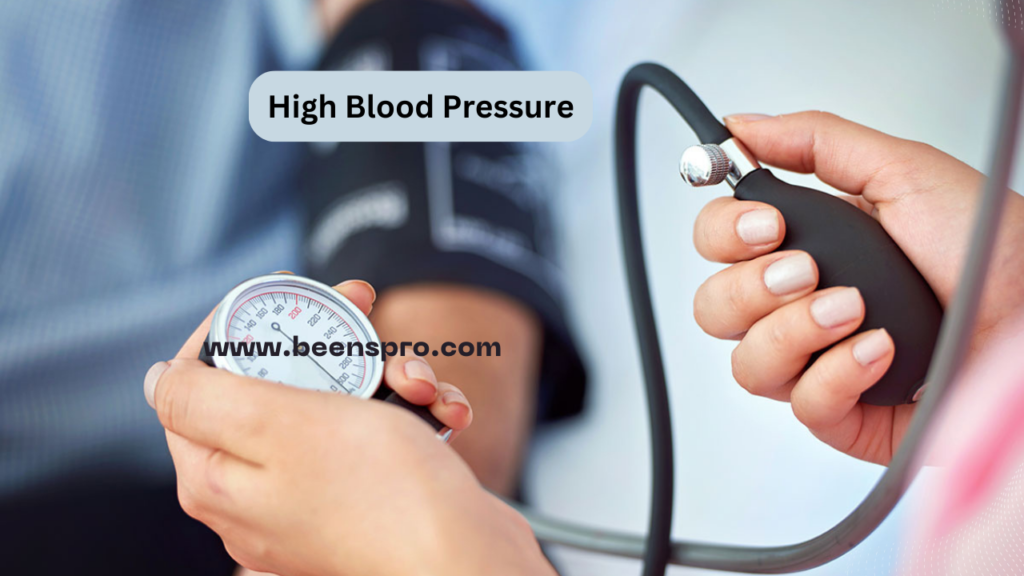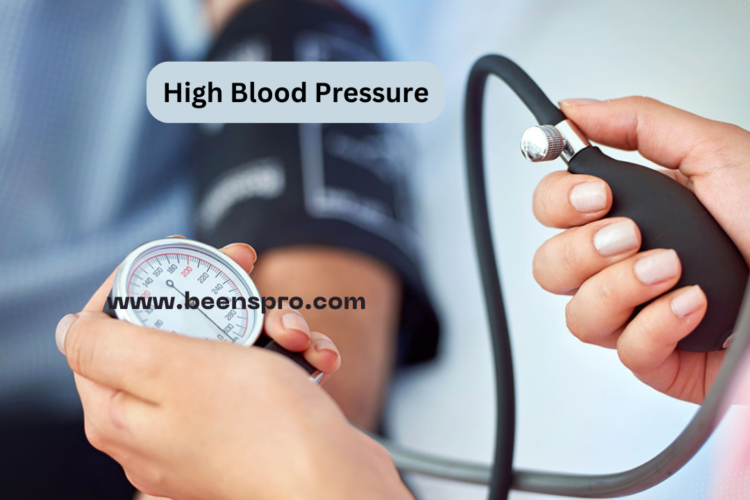
What is High Blood Pressure?
High blood pressure, also known as hypertension, is a medical condition where the force of blood against the walls of the arteries is consistently too high. This pressure is measured in millimeters of mercury (mmHg) and recorded as two numbers: systolic (the pressure when your heart beats) and diastolic (the pressure when your heart rests between beats).
- Normal blood pressure is typically around 120/80 mmHg. A reading consistently higher than 130/80 mmHg is considered high blood pressure.
- The systolic pressure measures the force during a heart beat, and diastolic pressure measures the force during the resting phase.
When left unmanaged, high blood pressure can damage the arteries, leading to serious complications like heart disease, stroke, and kidney damage. Understanding these readings and their significance is crucial to maintaining good health.
Symptoms of High Blood Pressure
High blood pressure often develops without any noticeable symptoms. This is why it’s often called the “silent killer.” While many people may not experience symptoms, common indicators of hypertension can include:
- Headaches
- Shortness of breath
- Dizziness
- Nosebleeds
- Chest pain (in extreme cases)
If you notice any of these symptoms, it’s essential to check your blood pressure regularly. Hypertension monitoring is crucial in identifying the condition before it leads to severe health issues.
Causes of High Blood Pressure
What Causes High Blood Pressure?
Several factors contribute to high blood pressure, many of which are lifestyle-related. Here are some primary causes:
- Genetics and family history: If your parents or close relatives had hypertension, you may be more likely to develop it.
- Poor diet: Excessive salt intake and a high-fat diet can contribute to high blood pressure by causing the body to retain more water, thus increasing the pressure in the arteries.
- Lack of physical activity: Inactive individuals tend to have higher blood pressure due to increased weight and poor circulation.
- Chronic stress: Emotional stress can lead to temporary increases in blood pressure and, over time, may lead to sustained hypertension.
Risk Factors for Hypertension
Apart from lifestyle choices, various risk factors play a significant role in the development of hypertension. These include:
- Age: Blood pressure naturally increases as you age due to the stiffening of arteries.
- Ethnicity: People of African descent are more likely to develop hypertension at an earlier age and have more severe cases.
- Smoking and alcohol consumption: Both smoking and excessive alcohol intake significantly increase blood pressure.
- Obesity: Excess weight puts extra strain on the heart and arteries, leading to high blood pressure.
Understanding these causes can help you manage and reduce your hypertension risk.
How to Lower High Blood Pressure
Natural Ways to Lower High Blood Pressure
If you have been diagnosed with high blood pressure, there are natural ways to manage it without relying solely on medication. Here are some proven methods:
- Regular exercise: Engaging in physical activity strengthens the heart, allowing it to pump blood more efficiently and lower pressure on the arteries. Activities such as walking, cycling, and swimming can help lower blood pressure.
- Reducing salt intake: High sodium levels can cause the body to retain fluid, which increases blood pressure. A low-sodium diet can significantly help in lowering hypertension.
- Stress reduction techniques: Practices like yoga, deep breathing exercises, and mindfulness meditation can help reduce stress levels and lower blood pressure naturally.
- Losing weight: Weight loss is one of the most effective long-term ways to manage high blood pressure. Even losing a small amount of weight can have a significant effect on your blood pressure levels.
These lifestyle changes not only help in managing high blood pressure but also improve your overall well-being.
Medical Treatments for High Blood Pressure
For many, medication is required to manage high blood pressure effectively. Antihypertensive drugs are commonly prescribed by healthcare providers. These include:
- Diuretics: Help the body eliminate excess sodium and water to lower blood pressure.
- ACE inhibitors: Relax blood vessels and reduce blood pressure by blocking the formation of a hormone that narrows blood vessels.
- Beta-blockers: Reduce heart rate and the amount of blood the heart pumps, which in turn lowers blood pressure.
Consulting with your healthcare provider is essential to find the most suitable treatment for your case.
Managing High Blood Pressure at Home
How to Monitor Blood Pressure at Home
Regular monitoring of your blood pressure at home is critical for anyone with hypertension. A home blood pressure monitor is an effective tool for tracking your readings. Here’s how you can ensure accurate readings:
- Use a validated monitor: Ensure the device is accurate and calibrated correctly.
- Take readings at the same time each day: Consistency helps in tracking your progress over time.
- Follow proper positioning: Sit with your back supported, feet flat on the floor, and arm at heart level when taking a reading.
This consistent tracking can help you keep a close eye on your blood pressure levels and make necessary adjustments to your treatment plan.
Blood Pressure Guidelines and Targets
Understanding blood pressure guidelines is essential for maintaining healthy levels. According to current medical guidelines:
- Normal: Below 120/80 mmHg
- Elevated: 120-129/80 mmHg
- Hypertension Stage 1: 130-139/80-89 mmHg
- Hypertension Stage 2: 140+/90+ mmHg
- Hypertensive Crisis: 180+/120+ mmHg
Consulting your healthcare provider for personalized targets is essential, especially if you are at risk or have been diagnosed with hypertension.
Preventing High Blood Pressure
How to Prevent High Blood Pressure in the First Place
Preventing hypertension is far easier than managing it. To lower your risk of developing high blood pressure:
- Adopt a healthy lifestyle: A balanced diet rich in fruits, vegetables, and whole grains while reducing salt and fats can help prevent high blood pressure.
- Exercise regularly: Aim for at least 30 minutes of physical activity most days of the week.
- Monitor your stress: Manage stress levels using techniques like meditation and relaxation exercises.
These proactive steps can help you maintain normal blood pressure levels and improve overall health.
The Impact of Hypertension on Your Health
Effects of High Blood Pressure on Your Heart and Cardiovascular System
If left untreated, hypertension can lead to serious heart conditions, including:
- Heart disease: Chronic high blood pressure can damage the arteries, leading to plaque buildup and narrowing of blood vessels.
- Stroke: High blood pressure increases the risk of stroke by causing blood vessels in the brain to rupture or become blocked.
- Heart failure: The heart may weaken over time as it works harder to pump blood against higher pressure.
Managing high blood pressure is critical in preventing these severe cardiovascular complications.
Hypertensive Crisis: What You Need to Know
A hypertensive crisis is a medical emergency where blood pressure rises quickly and dangerously, usually above 180/120 mmHg. If left untreated, it can lead to:
- Heart attack
- Stroke
- Kidney damage
If you experience symptoms like severe headaches, chest pain, or vision problems, seek immediate medical attention.
Conclusion
Managing high blood pressure is a lifelong commitment. By adopting healthy habits, monitoring your blood pressure, and following medical advice, you can lead a healthy life. Always consult with your healthcare provider for personalized treatment plans.
FAQs
What are the symptoms of high blood pressure?
High blood pressure often doesn’t show obvious symptoms, but common signs include headaches, shortness of breath, and dizziness. In some cases, it can lead to a hypertensive crisis if left untreated.
Can stress cause high blood pressure?
Yes, chronic stress is a significant risk factor for high blood pressure. It can lead to temporary spikes and, over time, contribute to sustained hypertension.
What is the best way to reduce high blood pressure naturally?
Physical activity, reducing salt intake, managing stress, and maintaining a healthy weight are all effective natural methods to lower high blood pressure.
What is a normal blood pressure reading?
A normal blood pressure reading is typically around 120/80 mmHg. Anything higher may indicate prehypertension or hypertension.
Can high blood pressure be cured?
While there is no permanent cure for high blood pressure, it can be managed effectively through lifestyle changes, medication, and regular monitoring.
